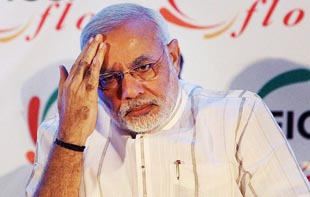 Washington, Apr 11: A controversial Congressional resolution, which among other things asks the American administration to maintain its policy of not issuing visa to BJP prime ministerial candidate Narendra Modi, now has more than 50 co-sponsors.
Washington, Apr 11: A controversial Congressional resolution, which among other things asks the American administration to maintain its policy of not issuing visa to BJP prime ministerial candidate Narendra Modi, now has more than 50 co-sponsors.Rush Holt from New Jersey and Barbara Lee from California are the two lawmakers to have signed onto the resolution (H Res 417), thus taking the number of co-sponsors to 51.
The bipartisan resolution was introduced by Congressmen Keith Ellison from the Democratic Party and Joe Pitts from the Republican Party last November.
Since then it has not only become an issue of contention among various Indian American groups, but also several lawmakers have questioned the intention of introducing such a resolution.
Several Congressmen have withdrawn too as its co-sponsors, but with Holt and Lee this week being the latest entrants, the total number of sponsor to this controversial resolution yesterday stood at 51 from nearly 30 states, of which 26 are Republican and 25 are from the Democratic Party.
The resolution also asks to include religious freedom and human rights as part of the Strategic Dialogue between the two countries.
It praises India's "rich religious diversity and commitment to tolerance and equality," while raising concerns over the "erosion" of religious freedom.
The resolution, the bipartisan Congressional Research Service (CRS) in its summary, recognises the suffering of Indian citizens who have been victims of religious violence, and also highlights the alleged role of Modi in the 2002 communal violence in Gujarat.
It declares that the House of Representatives shares the opinion of the Department of State and the US Commission on International Religious Freedom that the Gujarat government has not adequately pursued justice for the victims of religious violence in 2002 and expresses concern regarding reports about the alleged complicity of local officials.
It commends the US government for exercising its authority in 2005 under the International Religious Freedom Act of 1998 to deny a US visa to Narendra Modi on the grounds of religious freedom violations, and encourages it to review the applications of any individuals implicated in such violations under the same standard, the CRS said.
The resolution commends the role of India's National Human Rights Commission and the Indian Supreme Court, which has led to some convictions in Gujarat riot cases and the arrest of high-level leaders in the Gujarati administration.





Comments
Add new comment